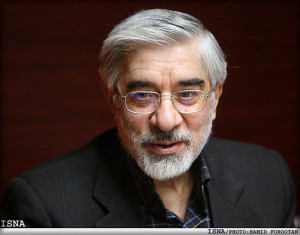Friday
Feb262010
Middle East Inside Line: Hamas Division, Ahmadinejad with Syria & Hezbollah, Mitchell to Resign?
 Friday, February 26, 2010 at 18:38
Friday, February 26, 2010 at 18:38  Hamas Divides over Shalit Case?: Haaretz says that negotiations over the captured Israeli soldier Gilad Shalit have divided Hamas, with the resignation of Mahmoud A-Zahar, a senior member of the negotiating team. Despite the efforts of German negotiator Gerhard Konrad, Israeli leaders have said that they will not release some senior Palestinian leaders as demanded by Hamas. A-Zahar's argued with Hamas political leader Khaled Meshaal over the handling of talks and then left his post.
Hamas Divides over Shalit Case?: Haaretz says that negotiations over the captured Israeli soldier Gilad Shalit have divided Hamas, with the resignation of Mahmoud A-Zahar, a senior member of the negotiating team. Despite the efforts of German negotiator Gerhard Konrad, Israeli leaders have said that they will not release some senior Palestinian leaders as demanded by Hamas. A-Zahar's argued with Hamas political leader Khaled Meshaal over the handling of talks and then left his post.Hamas' "Israel Spy" Speaks: Mosab Hassan Yousef, the son of Hamas founder Sheikh Hassan Yousef who worked for Israel's Shin Bet security service, converted to Christianity, and moved to California, said by phone: "I wish I were in Gaza now. I would put on an army uniform and join Israel's special forces in order to liberate Gilad Shalit. If I were there, I could help. We wasted so many years with investigations and arrests to capture the very terrorists that they now want to release in return for Shalit. That must not be done."
Ahmadinejad with Assad and Nasrallah: Iranian President Mahmoud Ahmadinejad, Syrian President Bashar al-Assad, and Hezbollah Secretary-General Hassan Nasrallah met in Damascus late Thursda. According to Al-Manar, Ahmadinejad met with Palestinian officials from at least 10 political movements during his visit. During that meeting, the Iranian president and the Palestinians expressed their desire for cooperation against Israeli "threats, aggressions," and moves regarding Islamic holy sites in Israel.
Mitchell to Resign?: Hadith a-Nass, a Nazareth-based daily Arab source, reported that special US Mideast envoy George Mitchell has requested to resign. The report claims that Mitchell is disillusioned over the bias of the State Department towards Israel and his failure to advance the resumption of peace negotiations. However, it is said that the White House has turned down Mitchell's request.
Palestine Moves if No Talks with Israel: Palestinian Authority chief negotiator Saeb Erekat, in an article, "The Political Situation in Light of Developments with the U.S. Administration and Israeli Government and Hamas's Continued Coup d'etat", threatens three steps unless negotiations with Israel are resumed.
One is an end to security cooperation with Israel, including the disbanding of the Palestinian security forces which have been trained by the US officials. The second is the nullification of the Oslo Accords and even the dissolution of the Palestinian Authority. The third? Abandoning pursuit of a two-state solution with Israel, and instead working toward a binational state that would exist on all the lands of historic Palestine.
Israel Expanding Settlements?: Haaretz has learned that Israel has plans to build another 600 homes in East Jerusalem.
tagged  Al-Manar,
Al-Manar,  Bashar Al-Assad,
Bashar Al-Assad,  East Jerusalem,
East Jerusalem,  George Mitchell,
George Mitchell,  Gerhard Konrad,
Gerhard Konrad,  Gilad Shalit,
Gilad Shalit,  Ha'aretz,
Ha'aretz,  Hadith a-Nass,
Hadith a-Nass,  Hamas,
Hamas,  Hezbollah,
Hezbollah,  Iran,
Iran,  Khaled Meshal,
Khaled Meshal,  Lebanon,
Lebanon,  Mahmoud A-Zahar,
Mahmoud A-Zahar,  Mahmoud Ahmadinejad,
Mahmoud Ahmadinejad,  Mosab Hassan Yousef,
Mosab Hassan Yousef,  Oslo Accords,
Oslo Accords,  Palestinian Authority,
Palestinian Authority,  Saeb Erekat,
Saeb Erekat,  Sheikh Hassan Nasrallah,
Sheikh Hassan Nasrallah,  Sheikh Hassan Yousef,
Sheikh Hassan Yousef,  Shin Bet,
Shin Bet,  Syria in
Syria in  Middle East & Iran
Middle East & Iran
 Al-Manar,
Al-Manar,  Bashar Al-Assad,
Bashar Al-Assad,  East Jerusalem,
East Jerusalem,  George Mitchell,
George Mitchell,  Gerhard Konrad,
Gerhard Konrad,  Gilad Shalit,
Gilad Shalit,  Ha'aretz,
Ha'aretz,  Hadith a-Nass,
Hadith a-Nass,  Hamas,
Hamas,  Hezbollah,
Hezbollah,  Iran,
Iran,  Khaled Meshal,
Khaled Meshal,  Lebanon,
Lebanon,  Mahmoud A-Zahar,
Mahmoud A-Zahar,  Mahmoud Ahmadinejad,
Mahmoud Ahmadinejad,  Mosab Hassan Yousef,
Mosab Hassan Yousef,  Oslo Accords,
Oslo Accords,  Palestinian Authority,
Palestinian Authority,  Saeb Erekat,
Saeb Erekat,  Sheikh Hassan Nasrallah,
Sheikh Hassan Nasrallah,  Sheikh Hassan Yousef,
Sheikh Hassan Yousef,  Shin Bet,
Shin Bet,  Syria in
Syria in  Middle East & Iran
Middle East & Iran 


